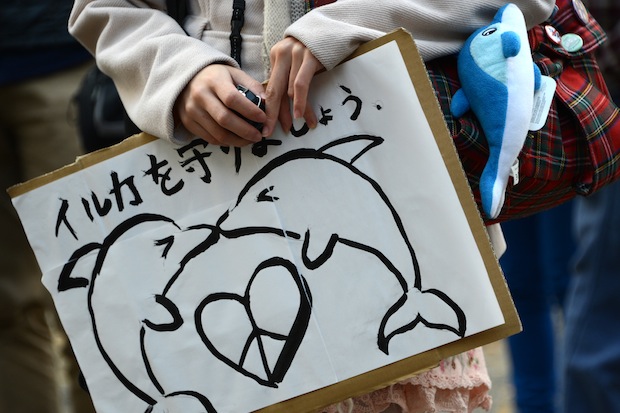It’s official: no one is safe from the killjoyism of Australia’s green-leaning chattering classes. If you thought the only people who had to put up with having their lifestyles mocked and monitored by Oz’s fun-allergic political set were bogans who like booze, appreciate a smoke and don’t mind having an occasional flutter on a pokie, think again. It turns out not even the Japanese are safe from the nannying instinct of this nation’s know-alls.
The ban on Japanese whaling in the Southern Ocean, agitated for by a motley crew of Australian Greens, former Labour ministers and hippies turned seafaring crusaders against Japs with harpoons, shows that the nanny state has gone global. Its writ now stretches beyond Aussie borders into the lives of faraway peoples who dare to do things that eco-friendly white folk in Sydney disapprove of.
This week, having been lobbied hard by assorted Aussies, the International Court of Justice ruled that Japan’s hunting of whales in the Southern Ocean is not, as Japan claims, ‘scientific’, and therefore must stop. In 1986, the International Whaling Commission imposed a moratorium on whaling except where it was being carried out in the interests of ‘scientific research’. Japan has claimed for years that its hunting of minke whales around Antarctica is done for scientific reasons, when in fact, as whale-pitying greenies never tire of pointing out, the slaughtered beasts really end up on the dinner plates of Japanese citizens. The ICJ has now officially decreed that Japanese whaling has diddly-squit to do with scientific research and has forbidden the whale-hunters from setting out in their bloodied boats.
The ban is being cheered as a victory for common decency over Japanese cruelty. Reading some of the self-congratulatory coverage, you could be forgiven for thinking Australia had won an actual war against Japan. ‘Australia’s risky whaling action against Japan has paid off’, gushes a Sydney Morning Herald writer. He praises Mark Dreyfus, the former Labor Attorney General who actually went to the ICJ to make an emotional plea for a ban on Japanese whaling, hailing him a ‘brave’ protector of whalekind.
Kevin Rudd and Peter Garrett, former bad rock singer turned Laborite conservationist, also get a fat pat on their backs for helping to stop the Japs. Elsewhere in the left Australian press, Japan is accused of having a ‘sad whale obsession’ and of indulging in ‘barbaric’ behaviour that decent Australians have now successfully halted. Imagine if Australians were judged by Japan to have a ‘sad kangaroo obsession’ and were ordered by an international body to stop tucking into kanga bangas and other ‘barbaric’ fare. You’d be pretty pissed off, right? Well, now you know how Japan feels.
Australia’s defenders of innocent whales against the bloody Japanese need to get over themselves. They haven’t struck a brilliant blow for humane values over foreign wickedness — rather, they’ve exported the miserabilism of modern-day nanny statism into foreign fields. The Aussie campaign for an end to the Japanese hunt was motored by the same imperious disdain for other people’s practices that has seen cigarettes stuffed into plain packs and boozing after 1.30am made a thing of the past.
As in those instances of using brute bans to halt allegedly backward behaviour, the underlying sentiment of the crusade against whaling is this: ‘Well, we don’t do that kind of thing, and we don’t understand how you could possibly enjoy doing it, so we’re going to use the law to force you to stop.’
There’s a word for that: intolerance. No amount of moral self-aggrandising among those who spearheaded the ban on Japanese whaling can disguise the fact that there’s a big dollop of prejudice to these kinds of campaigns. The culture war against whaling rehabiliates old ideas about the Japanese being a cruel race in a new PC lingo. Sea Shepherd, the hippyish sailors who harangue Japan’s whaling vessels, says Japan’s whale-hunting is a ‘sadistic perversion’. A Courier-Mail writer once lamented Japan’s ‘uncivilised barbarity’, contrasting it with Australia, ‘a civilised nation of pet-lovers’.
The modern ideal of cultural sensitivity, of not slating foreign peoples simply because you don’t like their practices, always goes out the window where Japan and the whales are concerned. In our postracial, postcolonial, post-everything era, the nonsense notion of ‘animal rights’ is one of the few remaining means through which one group of people can assert their presumed moral authority over another, as can be seen in everything from British head-shaking over Spaniards’ treatment of donkeys to American dog-lovers’ disgust at canine-chomping Koreans. Very often if you scratch an animal-rights activist, you’ll find a sneerer at Johnny Foreigner lurking underneath.
The Australian action against Japan also sets a dangerous precedent. One nation has used the bizarre fiction of international law — an unaccountable entity if ever there was one — to stop another nation from doing something it has been doing for centuries. This is, at root, an attack on national sovereignty, undermining a people’s and its government’s right to determine for themselves what to eat, whether and where to hunt, and fundamentally how to live.
I think eco-minded Westerners’ real problem with whaling is that it is the most explicit expression there is of man’s dominion over nature. This is an activity in which physically measly man, using weapons and technology, chases and kills the largest creatures on Earth. He riskily takes to the raging seas in order to capture and later eat the most enormous beasts. Whaling effectively says: ‘Screw you, Mother Nature — we’re in charge.’ At a time when we’re increasingly encouraged to be meek in the face of nature, to believe that natural forces are awesome and unconquerable, whaling seems alien, a crime against the eco-mindset.
Yes, Japan should stop using the spurious ‘scientific research’ argument to justify its whaling. Instead it should just come out and say that whaling is bracing, fun, even noble. It ennobles man, confirming his pole position in nature’s pecking order, and it ennobles whales, too, elevating them from being dumb beasts of the sea to participants in a bloody, exciting drama of epic proportions.
To chase and kill whales isn’t inhumane; it’s fully human, as when Captain Ahab in Moby-Dick doggedly pursues an elusive whale and ‘piled upon the whale’s white hump the sum of all the general rage felt by his whole race from Adam down…’
Got something to add? Join the discussion and comment below.
Get 10 issues for just $10
Subscribe to The Spectator Australia today for the next 10 magazine issues, plus full online access, for just $10.
Brendan O’Neill is editor of Spiked in London. He is in Australia this month as scholar-in-residence for the Centre for Independent Studies.
You might disagree with half of it, but you’ll enjoy reading all of it. Try your first month for free, then just $2 a week for the remainder of your first year.















Comments
Don't miss out
Join the conversation with other Spectator Australia readers. Subscribe to leave a comment.
SUBSCRIBEAlready a subscriber? Log in